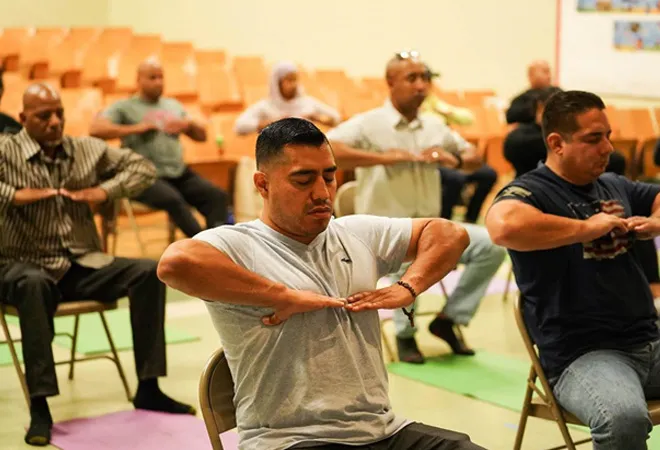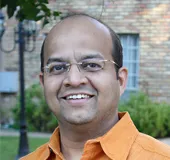
Ideally, we will all choose to live in a world of peace and harmony. However, today, unfortunately, we are witnessing an alarming rise in violence and conflicts around the world, which is threatening the fabric of our human society. From wars and refugee crises, to hate crimes, drugs, mental health issues, human trafficking, and discrimination, the challenges that we face are complex and multifaceted.
Globally, violence is
on the rise and can happen anywhere, and will affect people from all walks of life. For example, the ongoing wars in Syria, Yemen, and Ukraine have caused significant displacement of people from all socio-economic backgrounds. Even the developed world is not immune to violence. For instance, in the United States (US), thus far in 2023, there have been
268 mass shootings and over 7,700 people have died in gun violence-related incidents.
India, with its culture and wisdom of well-being, nonviolence, and harmonious co-existence, can play a crucial role in promoting sustainable peace and social cohesion in the world.
The global community needs to come together to address the root causes of violence and conflict and work towards creating a world that is inclusive, just, and peaceful.
India, with its culture and wisdom of well-being, nonviolence, and harmonious co-existence, can play a crucial role in promoting sustainable peace and social cohesion in the world.
Leveraging the country’s aspiration to be a Vishwa Guru and the legacy of Mahatma Gandhi that still inspires millions across the world, the work done by
Cities4Peace provides practical examples and a universal framework for meaningfully integrating India’s wisdom to enhance conflict resolution and peacebuilding programmes.
Peacebuilding strategies and the “human” dimension
The current approaches to peacebuilding are grounded in Western models and theories that prioritise addressing factors like cultural and structural violence and ensuring institutional solutions like well-functioning civic institutions, low levels of corruption, and equitable distribution of resources.
However, sustainable peacebuilding also requires that those affected by the conflict need to also address the psychological and emotional dimensions of the conflict. If the trauma in individuals and groups affected by violence and conflict is not addressed, then it can build up as frustration and anger and can potentially manifest into violence.
The need for this ‘inner development’ therefore provides the context and agency for the meaningful integration of India’s wisdom of inner peace to deepen the impact of the current conflict resolution and peacebuilding strategies.
The United Nations Development Programme (UNDP) has also recognised the importance of addressing this inner dimension and has recently started advocating for the integration of
Mental Health and Psychosocial Support (MHPSS) in conflict resolution and peacebuilding programmes. This includes activities, such as counselling, group therapy, and programmes that help address the individual and collective trauma, regulate emotions, and develop resilience and nonviolent communication skills to engage in constructive dialogue.
Even with regards to urban violence, several agencies including the Los Angeles County Office of Violence Prevention have started
advocating the need for programs that focus on trauma healing and building resilience.
The need for this ‘inner development’ therefore provides the context and agency for the meaningful integration of India’s wisdom of inner peace to deepen the impact of the current conflict resolution and peacebuilding strategies.
India’s wisdom of inner peace
India’s culture has long believed that to have peace in the world, communities need to live in harmony. To achieve this, individuals must, therefore, learn to develop inner peace, mutual respect and how to live in harmonious co-existence with each other.
Figure 1: Universal framework to achieve world peace
 Source: Author’s research
Source: Author’s research
Peace is not just the absence of conflict. It is the ability to deal with conflict in a peaceful manner. According to India’s wisdom traditions, peace is the innate nature of all human beings. Therefore, all Indic wisdom traditions advocate the practice of Yoga, non-violence, and meditation to transform negative emotions and develop inner peace. These practices have helped people from all walks of life, across the world for centuries. Several leaders like
Rev. Dr Martin Luther King Jr, and
Steve Jobs have acknowledged that exposure to India’s culture and wisdom helped them to deepen their leadership purpose, vision, and impact.
Cities4Peace: A novel approach to peacebuilding
Leveraging India’s wisdom of inner peace and harmonious co-existence, the
Cities4Peace initiative of the International Association for Human Values and the Art of Living Foundation works with civic leaders to reduce violence and promote peace and social cohesion in communities impacted by conflict across the world. The initiative has worked with several local, regional, and international governmental and non-governmental institutions to build the capacity of local leaders and changemakers to design unique solutions to community-specific challenges.
As an example, in Los Angeles, the programme was used for enhancing trust between the community members and police officers. The city witnesses approximately
25,000 violent crimes annually, with over 70 percent of these incidents in the inner city of South Los Angeles. Such exposure to extreme violence has created stress for residents and increased tensions between community members and the Los Angeles Police Department (LAPD).
Between March and June 2019, the Cities4Peace programme brought together the local LAPD police officers and diverse community stakeholders, including former gang members, at-risk youth, teachers, and parents from across the Harvard Park neighbourhood of South LA, for a specially designed
Ambassadors of Peace Certification training programme. This
training focused on building participants’ capacity, using yoga and
Sudarshan Kriya (SKY) breathing and meditation practices to assist them in healing from their trauma and developing greater compassion.
The city witnesses approximately 25,000 violent crimes annually, with over 70 percent of these incidents in the inner city of South Los Angeles.
Thereafter, through interactive discussions, participants were supported in building stronger interpersonal relations and taking ownership of building a shared vision for peace in their neighbourhood. The George Mason University’s
research on this programme’s impact showed that after two months of the programme, over 90 percent of the participants had reported a heightened capacity to be relaxed, focused, and remain calm in challenging situations and an enhanced ability to develop social connections.
As another example, Cities4Peace was invited by the United Nations Peacekeeping Force in Cyprus (UNFICYP) from March to June 2022 to empower leaders from both Turkish and Greek Cypriot communities to promote peace and social harmony on the island.
Through interactive discussions and group processes, the Cities4Peace programme enabled participants to develop systems thinking and build trusted networks. Subsequently, participants were encouraged to design and execute a ‘Peace in Action’ project that would make a positive difference for the residents on the island. These projects ranged from conducting a session on mental well-being for a bi-communal group of students from the university, a bi-communal community music concert, a podcast on the role of parenting between mothers from both sides of the divide, etc.
Conclusion
The field of conflict resolution and peacebuilding has traditionally focused on external factors and institutional solutions, however, there is a growing recognition that the inner development of all stakeholders affected by violence is critical for achieving sustainable peace.
India’s soft power derives not only from its cultural heritage (music, dance, arts, etc.) and economic strength but also from its rich history of philosophical and wisdom traditions that have influenced people globally for centuries, to discover healing, solace and transformation and learn to peacefully coexist.
The Cities4Peace’s work showcases how we can deepen the impact of these peacekeeping and peacebuilding missions by helping to resolve conflicts and build sustainable peace, thereby, aiding India’s aspiration to become a ‘Vishwa Guru’.
India has already gained a strong
reputation as a responsible global actor through its diplomatic efforts in UN peacekeeping and providing development aid in areas of conflict and disaster management. The Cities4Peace’s work showcases how we can deepen the impact of these peacekeeping and peacebuilding missions by helping to resolve conflicts and build sustainable peace, thereby, aiding India’s aspiration to become a ‘
Vishwa Guru’.
The Indian diaspora is also affected by local and regional violence, for example, the
death of Indians in mass shootings in America and the
suffering of Indian students at the beginning of the Russia-Ukraine conflict. Therefore, as ambassadors of India’s culture and values, the diaspora needs to play a more significant role in their countries by also promoting India’s wisdom as a key enabler in solving local and regional challenges. This will also help the diaspora strengthen its influence and promote India’s thought leadership on the world stage.
Mandar Apte currently manages the Cities4Peace initiative. Prior to this, Mandar was a visiting scholar at George Mason University School for Conflict Analysis & Resolution
The views expressed above belong to the author(s). ORF research and analyses now available on Telegram! Click here to access our curated content — blogs, longforms and interviews.



 Ideally, we will all choose to live in a world of peace and harmony. However, today, unfortunately, we are witnessing an alarming rise in violence and conflicts around the world, which is threatening the fabric of our human society. From wars and refugee crises, to hate crimes, drugs, mental health issues, human trafficking, and discrimination, the challenges that we face are complex and multifaceted.
Globally, violence is
Ideally, we will all choose to live in a world of peace and harmony. However, today, unfortunately, we are witnessing an alarming rise in violence and conflicts around the world, which is threatening the fabric of our human society. From wars and refugee crises, to hate crimes, drugs, mental health issues, human trafficking, and discrimination, the challenges that we face are complex and multifaceted.
Globally, violence is 
 PREV
PREV


